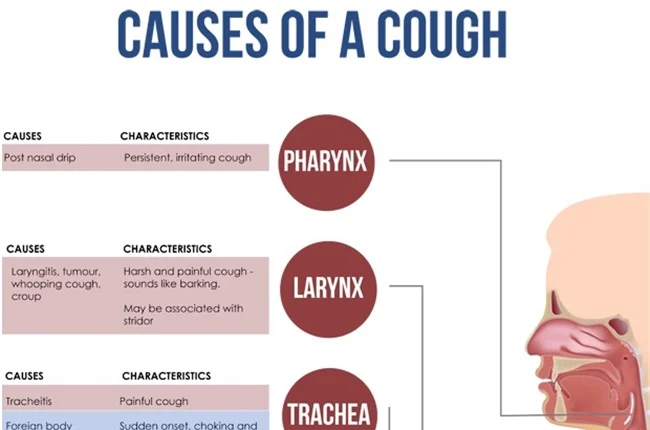A cough is a common reflex that helps clear your throat and airways of mucus, foreign particles, or irritants. It can also be a symptom of various conditions that affect your respiratory system, such as infections, allergies, asthma, or cancer. A cough can be acute (short-term) or chronic (long-term), depending on how long it lasts and what causes it. A cough can be annoying, uncomfortable, or even painful, but it usually goes away on its own or with simple home remedies. However, sometimes a cough can be a sign of a serious problem that requires medical attention.
Types of Cough
There are different types of cough, depending on their sound, quality, and timing. Some of the common types are:
• Dry cough. This is a type of cough that produces little or no mucus. It can be caused by irritation, inflammation, or infection of the throat or airways. It can also be a side effect of some medications, such as angiotensin-converting enzyme (ACE) inhibitors used for high blood pressure or heart conditions.
• Wet cough. This is a type of cough that produces mucus or phlegm. It can be caused by excess mucus production due to infections, allergies, asthma, chronic bronchitis, or smoking. It can also be a sign of a more serious condition, such as pneumonia or lung cancer.
• Chesty cough. This is a type of wet cough that produces thick, sticky mucus that is hard to expel. It can be caused by infections, such as bronchitis or pneumonia, or by chronic conditions, such as cystic fibrosis or chronic obstructive pulmonary disease (COPD).
• Barking cough. This is a type of dry cough that sounds like a seal’s bark. It can be caused by inflammation of the voice box (larynx) or windpipe (trachea), usually due to viral infections, such as croup or laryngitis. It can also be caused by foreign objects in the throat or airways.
• Whooping cough. This is a type of wet cough that produces violent and uncontrollable coughing fits followed by a high-pitched whooping sound when inhaling. It can be caused by a bacterial infection called pertussis, which is highly contagious and dangerous for infants and young children
• Nighttime cough. This is a type of cough that occurs mainly at night or when lying down. It can be caused by postnasal drip (mucus dripping from the back of the nose into the throat), gastroesophageal reflux disease (GERD), asthma, heart failure, or lung cancer.
Causes of Cough
There are many possible causes of a cough, depending on whether it is acute or chronic.
Some common causes are:
• Viral infections. These are the most common cause of acute coughs, such as the common cold, the flu, or COVID-19. They can cause inflammation and irritation of the throat and airways, leading to dry or wet coughs. They usually last for 1 to 2 weeks and resolve on their own or with antiviral medications.
• Bacterial infections. These are less common but more serious cause of acute coughs, such as strep throat, whooping cough, or pneumonia. They can cause infection and inflammation of the throat, airways, or lungs, leading to wet or chesty coughs with yellow or green mucus. They usually require antibiotics and medical attention.
• Allergies. These are a common cause of chronic coughs, especially in people with allergic rhinitis (hay fever) or asthma. They can cause excess mucus production and inflammation of the nose, sinuses, and airways, leading to wet or dry coughs with clear mucus. They can be triggered by environmental allergens such as pollen, dust mites, mold, or animal dander. They can be treated with antihistamines, decongestants, nasal sprays, or inhalers.
• Asthma. This is a common cause of chronic coughs, especially in children and young adults. It is a condition that causes narrowing and inflammation of the airways due to various triggers such as allergens, exercise, cold air, or stress. It can cause dry or wet coughs with wheezing and shortness of breath. It can be treated with inhalers that open up the airways (bronchodilators) or reduce inflammation (corticosteroids).
• Smoking. This is another common cause of chronic coughs, especially in long-term smokers. It is a habit that damages the lungs and airways due to exposure to tar, nicotine, and other harmful chemicals in tobacco smoke. It can cause dry or wet coughs with dark mucus and increased risk of infections and cancers. The best treatment is to quit smoking and avoid secondhand smoke exposure.
• Medications. Some medications can cause chronic coughs as a side effect, especially ACE inhibitors used for high blood pressure or heart conditions. They can cause dry coughs due to accumulation of a chemical called bradykinin in the lungs that causes irritation and inflammation. The treatment is to switch to another medication with the help of your doctor.
• Other conditions. Some other conditions that can cause chronic coughs include GERD (a condition where stomach acid flows back into the esophagus), postnasal drip (a condition where mucus drips from the back of the nose into the throat), sinusitis (a condition where the sinuses become inflamed due to infection or allergy), tuberculosis (a bacterial infection that affects the lungs), fungal infections (such as aspergillosis or histoplasmosis that affect the lungs), lung cancer (a malignant tumor that grows in the lungs), or heart failure (a condition where the heart cannot pump enough blood to meet the body’s needs).
Symptoms of Cough
Cough symptoms vary depending on the type and cause of the cough.
Some common symptoms that may accompany a cough are:
• Mucus. This is a sticky fluid that is produced by the nose,
sinuses,
and lungs to trap and remove foreign particles and microbes from the respiratory system. It can vary in color from clear to yellow to green depending on the cause and severity of the infection or inflammation. It can also vary in thickness from thin to thick depending on the hydration level and humidity level.
• Sore throat. This is a pain or discomfort in the throat that can be caused by irritation, inflammation, or infection of the throat tissue due to various factors such as dry air, allergens, irritants, or microbes. It can also be caused by excessive coughing that strains the throat muscles and vocal cords.
• Fever. This is an increase in body temperature above normal levels due to an immune response to fight off an infection or inflammation in the body. It can range from mild to high depending on the severity and type of infection or inflammation. It can also cause other symptoms such as chills, shivering, sweating, headache, muscle ache, and fatigue.
• Shortness of breath. This is a difficulty breathing normally due to reduced airflow in and out of the lungs due to various factors such as narrowing or obstruction of the airways due to swelling, mucus, spasm, or foreign objects; reduced lung function due to damage, disease, or aging; or reduced oxygen supply due to low blood pressure, anemia, or heart failure. It can also cause other symptoms such as chest pain, dizziness, confusion, and anxiety.
Diagnosis of Cough
To diagnose the cause of a cough, a doctor will usually perform a physical examination and ask about the history and symptoms of the problem. The doctor may also order some tests to confirm the diagnosis or rule out other possible causes. Some of these tests are:
• Chest X-ray. This is a type of imaging test that uses a small amount of radiation to produce images of the chest and lungs. It can help detect abnormalities or diseases in the lungs, such as pneumonia, tuberculosis, lung cancer, or heart failure.
• Sputum culture. This is a type of laboratory test that involves collecting a sample of mucus from the lungs and growing it in a special medium to identify the type and cause of infection, such as bacteria, fungus, or virus.
• Blood test. This is a type of laboratory test that involves drawing a sample of blood from a vein and measuring the levels of certain substances in the blood that may indicate inflammation, infection, allergy, autoimmunity, or metabolic disorders. Examples of blood tests include complete blood count (CBC), erythrocyte sedimentation rate (ESR), C-reactive protein (CRP), white blood cell differential (WBC diff), immunoglobulin E (IgE), thyroid function tests (TFTs), and glucose.
• Allergy test. This is a type of laboratory test that involves exposing the skin or blood to small amounts of different substances that may trigger an allergic reaction and observing the response. This can help identify the specific allergens that cause the cough and guide the treatment and prevention strategies.
• Pulmonary function test. This is a type of test that measures how well the lungs work by assessing the airflow, lung volume, and gas exchange in the lungs. It can help diagnose and monitor conditions that affect the lungs, such as asthma, COPD, or lung cancer.
Treatment of Cough
The treatment of cough depends on its cause, type, and severity. The main goals of treatment are to relieve symptoms, treat the underlying condition, and prevent complications. Some common treatments for cough are:
• Medications. These can help treat infections, inflammations, allergies, or diseases that cause cough. They can be taken orally, applied topically, inhaled, or injected into the body. Examples of medications include antibiotics for bacterial infections, antivirals for viral infections, antifungals for fungal infections, antiparasitics for parasitic infections, corticosteroids for inflammatory conditions, immunosuppressants for autoimmune diseases, biologics for cancer, antihistamines for allergic reactions, decongestants for nasal congestion, expectorants for mucus production, cough suppressants for dry coughs, bronchodilators for airway constriction, and mucolytics for thick mucus.
• Home remedies. These can help ease cough symptoms and promote healing by using natural substances or methods that have soothing or healing effects. They can be used alone or in combination with other treatments depending on your preference and response. Examples of home remedies include honey for antibacterial and anti-inflammatory properties, lemon for vitamin C and antioxidant properties, ginger for anti-inflammatory and antiviral properties, garlic for antibacterial and antifungal properties, turmeric for anti-inflammatory and antioxidant properties, salt water gargle for cleansing and soothing the throat, steam inhalation for loosening mucus and opening airways, humidifier or vaporizer for adding moisture to the air and preventing dryness and irritation in the throat and airways.
• Lifestyle changes. These can help prevent or reduce cough by avoiding or minimizing exposure to factors that trigger or worsen cough. They can also help improve your overall health and well-being by enhancing your immune system and lung function. Examples of lifestyle changes include quitting smoking and avoiding secondhand smoke exposure; avoiding allergens or irritants such as pollen, dust mites, mold, or animal dander; wearing a mask or covering your mouth and nose when exposed to pollutants or germs; drinking plenty of fluids to stay hydrated and thin mucus; eating a balanced diet rich in fruits, vegetables, and lean proteins to boost your immunity; getting enough rest and sleep to recover from infections or inflammations; managing stress levels to reduce inflammation and improve mood; exercising regularly to strengthen your respiratory muscles and improve blood circulation.
When to See a Doctor
Cough is usually not a medical emergency, but it can be a sign of a serious condition that requires prompt diagnosis and treatment.
Some situations when it is advisable to see a doctor for cough are:
• The cough is severe, persistent, or unexplained.
• The cough is accompanied by fever, chills, night sweats, weight loss, or other signs of infection or systemic illness.
• The cough produces blood, rust-colored sputum, or foul-smelling sputum.
• The cough causes chest pain, shortness of breath, wheezing, or difficulty swallowing.
• The cough is caused by an injury that results in bleeding, infection, or foreign object in the throat or airways.
• The cough does not improve within 2 weeks despite home remedies and OTC medications.
Summary
Cough is a common reflex that helps clear your throat and airways of mucus, foreign particles, or irritants. It can also be a symptom of various conditions that affect your respiratory system, such as infections, allergies, asthma, or cancer. Cough can be acute (short-term) or chronic (long-term), depending on how long it lasts and what causes it. Cough can be annoying, uncomfortable, or even painful, but it usually goes away on its own or with simple home remedies. However, sometimes a cough can be a sign of a serious problem that requires medical attention. In this blog post, we explored some of the common types, causes, symptoms, and treatments for cough.



